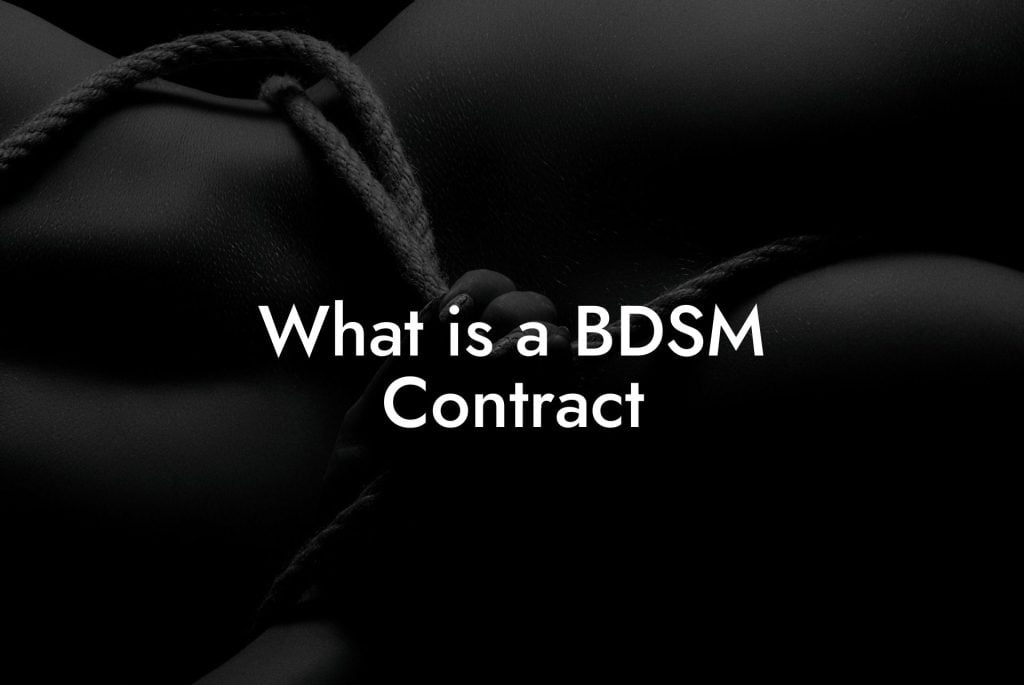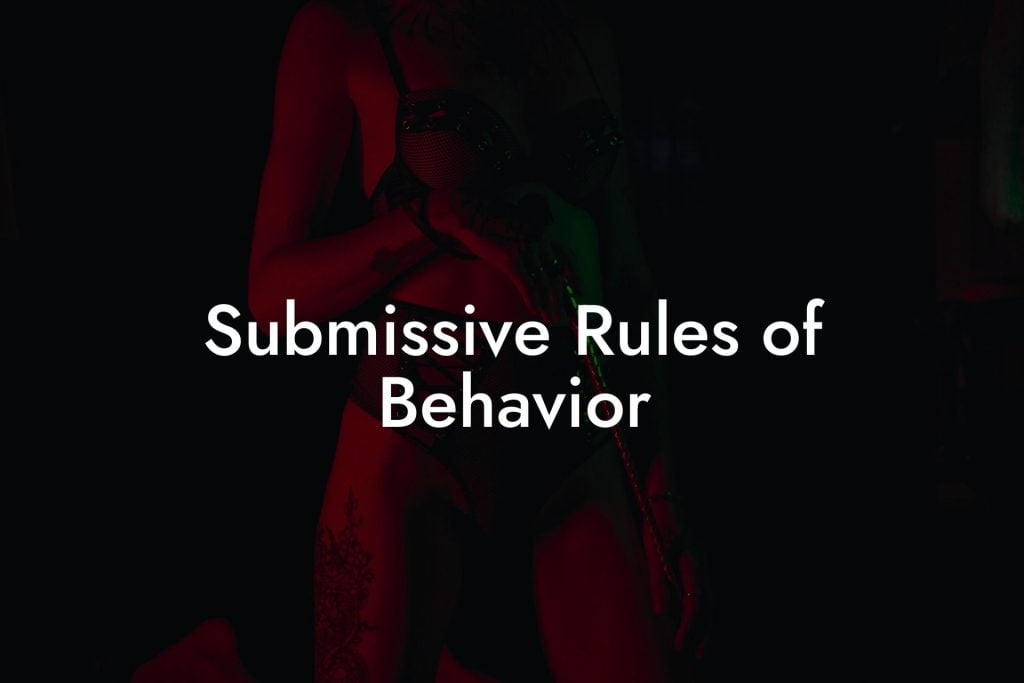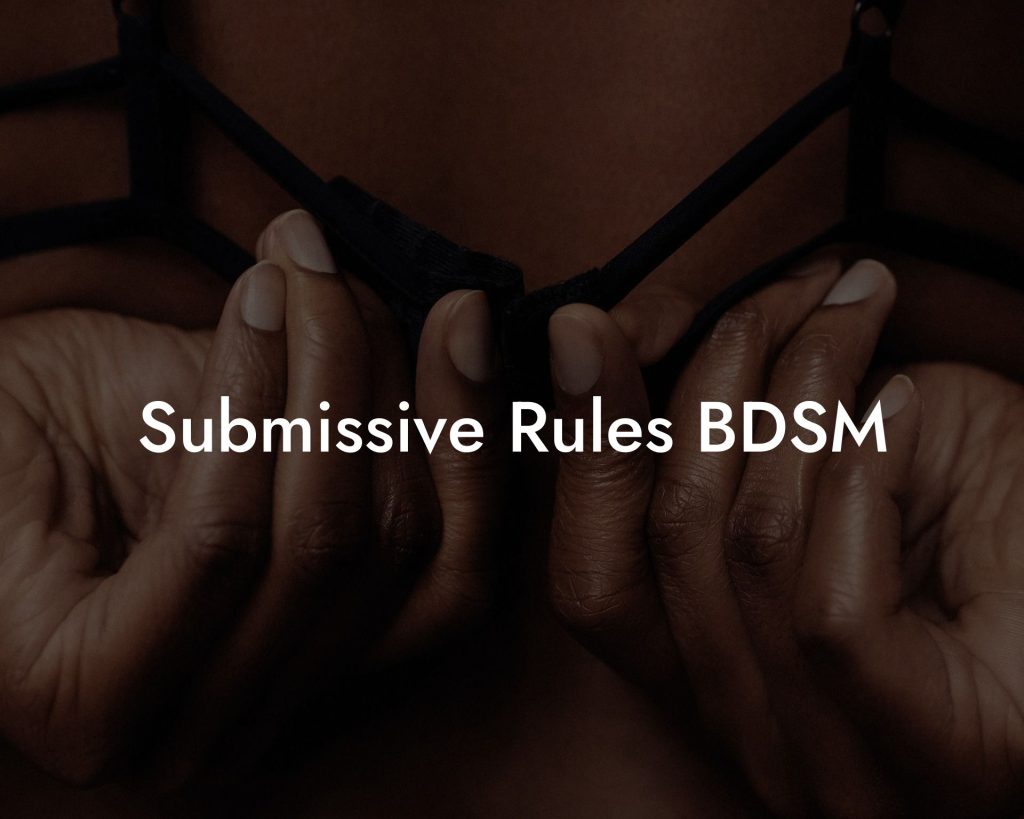Dominance and submission are key elements of the BDSM world, where power dynamics and trust play vital roles. Whether you're a dominant exploring your control or a submissive surrendering to pleasure, understanding the rules is crucial. In this article, we delve into the essential guidelines for dominants and submissives, from establishing trust to setting boundaries and everything in between. So, let's jump into the fascinating world of dominance and submission and unlock the key to a fulfilling BDSM experience.
In any BDSM relationship, consent is the cornerstone of trust and respect. It’s more than just saying “yes” or “no”—it’s about openly communicating your desires, limits, and expectations. But trust doesn’t end with a conversation—it’s built through ongoing, clear agreements. That’s where our Dominant & Submissive BDSM Contract Pack comes in. Find out more →
Dominant Rules
Consensual Power Exchange
The foundation of any dominant-submissive relationship is built on absolute consent. Both parties must willingly agree to the power exchange dynamic, discuss limits, and negotiate boundaries to ensure a safe and consensual experience.
Trust and Communication
Open and honest communication is vital in establishing trust between a dominant and a submissive. Regular check-ins, discussing desires, fears, and any discomfort, create a safe and healthy space for exploration.
Negotiating Kinks and Limits
Before engaging in any BDSM activities, it's crucial to discuss and negotiate each person's kinks, desires, and limits. Consent must be obtained before trying anything new, and boundaries should always be respected.
Taking Responsibility
Dominants hold the responsibility of guiding and taking care of their submissives. This includes physical and emotional well-being, checking in on their subs, and ensuring their needs are met within the pre-discussed boundaries.
Looking for the best BDSM & Kink OnlyFans content creators? Here is a list of of our favourites that you will love:
-
- Best BDSM & Fetish OnlyFans - Molly✨ >> Link
- Best BBW & Huge Ass OnlyFans - Naughty Hanna Zimmer 💜🎀 >> Link
- Best Sexy Gaming Nerd OnlyFans - 🎮 Gracy EstuSWEET 🎮 >> Link
- Best Fetish & Kink Messaging OnlyFans - 💫Lola La Fleur 💫 >> Link
- Best Girl Next Door OnlyFans - ☀️Lily ⛅ >> Link
- Best Tiny European OnlyFans - 💝 Ami Allison 💝 >> Link
- Best Cosplay OnlyFans - 🐱 Little Kitty Kate 👉👌 >> Link
- Best Little OnlyFans - 🧸 Katya 🙇♀️ Sun >> Link
- Best Sub OnlyFans - 🍌Hanna Banana🍌 >> Link
- Best Teen & Huge Tits OnlyFans - ❣️Anny❣️19 y.o. BUSTY student girl >> Link
- Best Tiny Tits OnlyFans - ⍣⭐️ Sofia Parker ⭐️⍣ >> Link
- Best Sub & Huge Boobs OnlyFans - Nika Huge Boobs >> Link
- Best Kink OnlyFans - Sofia💖 >> Link
- Best Fetish & Girl Next Door OnlyFans - Hillary is Wet 💦 >> Link
- Best Dirty Latina OnlyFans - Paula Flores 😈 >> Link
Not quite what you are looking for? View the full list →
Submissive Rules
Consent and Trust
Just like dominants, submissives must give their consent willingly and trust their dominants to ensure a safe and consensual experience. Honesty about boundaries and fears is crucial for establishing trust.
Obeying the Dominant
Submissives are expected to follow the instructions and requests of their dominants. This can include tasks, rituals, or specific protocols that keep the power dynamic alive and maintained within the established boundaries.
Safewords and Signals
Submissives have the right to use safewords or signals when they feel uncomfortable, overwhelmed, or need to pause or stop an activity immediately. Dominants must respect and respond to these in order to maintain trust and safety.
Self-Care and Aftercare
Submissives should prioritize their well-being by practicing self-care. Aftercare is especially important, as it involves providing comfort, reassurance, and support to the submissive after an intense or emotional scene.
Frequently Asked Questions
What is a BDSM contract?
A BDSM contract is a mutually agreed-upon document that outlines the boundaries, limits, roles, and expectations of all parties involved in a BDSM relationship. The contract is meant to provide a clear framework for consensual power exchange, ensuring that each person's needs and limits are understood and respected.
Why are contracts important in BDSM?
Contracts are important in BDSM because they foster open communication and trust between partners. They help clarify the power dynamics and expectations, ensuring that all parties have a mutual understanding of consent and boundaries. This helps prevent misunderstandings and reinforces the safety of the relationship.
How do BDSM power dynamics work?
BDSM power dynamics involve the consensual exchange of power and control between individuals. One person (the Dominant) assumes more control, while the other (the Submissive) agrees to relinquish some level of control. This dynamic is custom-tailored to the preferences and limits of the individuals involved.
What is consent in BDSM, and why is it critical?
Consent in BDSM is the explicit, informed, and voluntary agreement to participate in a particular activity. It is critical because it respects personal boundaries, ensures safety, and distinguishes BDSM from abuse or coercion. Without consent, BDSM activities could cause harm and violate personal rights.
How do trust and safety interplay in a BDSM relationship?
Trust and safety are interdependent in a BDSM relationship. Trust is built through open communication, honest discussion of limits and desires, and the consistent respect for each other's boundaries. Safety is maintained through practicing consent, using safe words, and educating oneself about the risks involved in BDSM activities.
Can a BDSM contract be modified?
Yes, a BDSM contract can and should be modified if the needs, desires, or limits of the individuals change. It is important to regularly review the contract and maintain open communication to ensure it remains relevant and consensual for all parties.
Are BDSM contracts legally binding?
While BDSM contracts may be taken very seriously by the individuals involved, they are not typically considered legally binding documents. However, they can demonstrate the consensual nature of the relationship and the precautions taken to ensure informed consent.
What should be included in a BDSM contract?
A BDSM contract should include detailed descriptions of roles, responsibilities, boundaries, limits, safety protocols, safe words, and any other agreements regarding the BDSM activities. It should also specify the duration of the contract and the procedure for renegotiation or termination.
How do you discuss and set limits in BDSM?
Limits in BDSM are discussed through open and honest communication before engaging in activities. It's important to express what you are and are not comfortable with, and to ask about your partner's limits. It can also be helpful to differentiate between 'soft limits' (activities you're unsure about but willing to try) and 'hard limits' (activities you do not consent to under any circumstances).
What are safe words, and how do they function?
Safe words are pre-agreed signals used to pause, slow down, or stop a BDSM activity immediately. They function as an essential safety mechanism, enabling individuals to communicate their level of comfort and withdraw consent if necessary. Safe words should be easy to remember and distinguishable from other dialogue during a scene.
Is negotiation necessary in all BDSM encounters?
Yes, negotiation is necessary in all BDSM encounters to ensure that all parties have a clear understanding of what will take place. It enables individuals to discuss their desires, limits, and the type of play they consent to. This ensures that each experience is consensual and enjoyable for everyone involved.
How do you ensure aftercare following a BDSM scene?
Aftercare involves attentive care and communication following a BDSM scene to help all parties transition back to a non-scene reality. It may include physical comfort, such as cuddling, as well as emotional support, like discussing the experience and reaffirming mutual respect and care. The specific needs for aftercare can vary and should be discussed beforehand.
Can anyone participate in a BDSM relationship?
Anyone of legal age who is capable of giving informed consent can participate in a BDSM relationship, as long as they respect the principles of safety, consent, and mutual respect. It is imperative that individuals understand their own boundaries and are able to communicate effectively with their partners.
Are there different types of BDSM contracts?
Yes, there are different types of BDSM contracts to accommodate the diverse range of relationships and dynamics within the BDSM community. Contracts can range from simple verbal agreements to detailed written contracts and can vary based on the duration and extent of the relationship.
How often should a BDSM contract be reviewed?
BDSM contracts should be reviewed regularly, at intervals mutually agreed upon by the individuals involved. This review process allows for adjustments and updates to reflect any changes in desires, limits, or circumstances. Regular reviews also reinforce the importance of open communication and consent.
What does a scene entail in BDSM?
A 'scene' in BDSM refers to a set period during which specific BDSM activities occur. These activities are typically pre-negotiated and can involve a variety of practices, from role-playing and restraint to impact play and more. A scene is bounded by consent and often incorporates safe words to maintain safety and respect.
Is previous experience required to engage in BDSM?
No, previous experience is not required to engage in BDSM. However, it is important for beginners to educate themselves about the practices, dynamics, and safety measures involved in BDSM. Attending workshops, reading educational materials, and communicating with experienced individuals can be very helpful.
What if a safe word is ignored during a BDSM scene?
If a safe word is ignored, it constitutes a serious breach of trust and consent. It is imperative to stop the scene immediately, and steps should be taken to address the violation. This could involve ending the relationship or seeking support from the BDSM community. Safety and respect are non-negotiable elements of a healthy BDSM encounter.
How to cope with negative feelings after a BDSM activity?
Coping with negative feelings after a BDSM activity involves processing the experience through communication, self-reflection, and sometimes seeking support from friends, a therapist, or within the BDSM community. It's important to identify the cause of these feelings and to address them with your partner(s) constructively. Aftercare can also play a crucial role in managing emotional responses.
Do I need a safe word if my partner and I trust each other implicitly?
Yes, even in a relationship with implicit trust, a safe word is a crucial safety tool. It allows for clear communication during BDSM activities, when normal cues may be harder to interpret. Safe words provide a straightforward way of expressing the need to pause or stop, regardless of trust levels.
Can you back out of a BDSM contract if you're uncomfortable?
Absolutely. A BDSM contract is based on the principle of consensual agreement between all parties involved. If at any point you become uncomfortable or wish to change the terms of the contract, you have the right to bring this to your partner's attention and renegotiate or terminate the contract as necessary.
Now that you've gained a deeper understanding of the dominant-submissive rules in the BDSM world, it's time to put your knowledge into practice. Remember, consent, trust, communication, and boundaries are the pillars of a healthy BDSM relationship. Explore more informative guides and resources on Filthy Adult's blog, order our Ultimate BDSM Contract Pack to further enhance your experiences, and check out our fetish shop for exciting products to elevate your pleasure. Don't forget to share this article with fellow kink enthusiasts and let the exploration begin!













